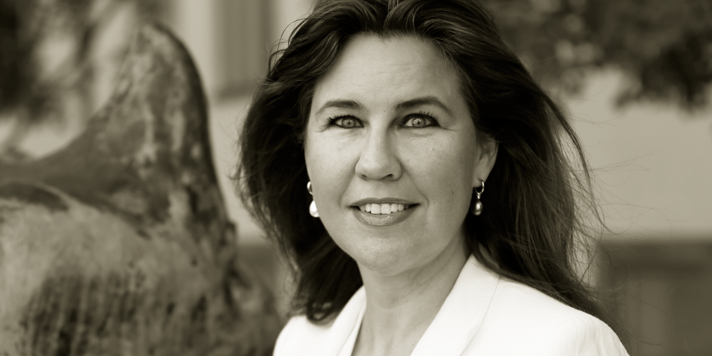“We must protect and win democracy every day”
Published
Sweden has long been at the forefront of promoting, protecting and safeguarding democracy throughout the world. The MFA’s drive for democracy will deepen and strengthen these efforts.
“The drive for democracy is a reaction to the pushback against democracy around the world. When authoritarian powers grow stronger, the foundation of our safety and security is under threat. Sweden has a long tradition and strong engagement in the area of human rights. We are now pulling out all the stops to protect democracy,” says Annika Ben David, Ambassador for Human Rights, Democracy and the Rule of Law.

Annika Ben David paints a rather gloomy picture of the status of democracy in the world today.
“Democracy is admittedly spreading to countries where it has never taken hold before. But almost half of the world’s population is currently living in countries where democracy is on the decline. More countries are moving in a negative direction and fewer are making progress. According to our research partners, just some 20 countries can currently be considered full democracies. And it is just a few per cent of the world’s population who live in these countries,” she says.
These developments are taking place as human rights and the rule of law are being challenged and questioned to an ever greater extent. There is an obvious break in the positive trend that has been under way since the 1970s and that culminated in the fall of the Berlin Wall. In recent years, more than 50 countries have introduced legislation undermining democracy. A relatively new development is that democracy is also eroding stable governance.
“We are seeing a deliberate weakening of citizens’ participation and the separation of powers. Thi gives rise to populist and polarising currents. Social and economic gaps and inequality are fuelling citizens’ frustrations. The democratic space is shrinking,” says Annika Ben David.
There has long been a consensus within the EU on democratic values. But a number of Member States have now started moving in a socially conservative direction, with freedom of the media and academia declining and the judicial system being politicised.
“A growing trend is that it has become more difficult to defend these issues, including at home in the EU, making it all the more important that we take a stance. Introducing human rights has become more difficult and instead of making progress we have been forced to spend time defending positions and decisions that we have already agreed on,” says Annika Ben David.
Ensuring support for, defending and promoting democracy is a priority for the Swedish Government. The drive for democracy aims to create the conditions for dialogue and greater knowledge about democracy throughout the world. The Ministry for Foreign Affairs has identified ten focus areas for the drive that are to provide the point of departure and inspiration for continued efforts. These include protecting human rights and strengthening free media and women’s political participation. Trade union rights and the rights of LGBTI people are other examples of priority areas.
Efforts to protect these issues will be integrated into all activities. There will be a special focus on highlighting young people and their voices – tomorrow’s leaders. Public diplomacy is a key tool for creating dialogue and debate in countries of operation and thus an important part of the drive.
So how should we talk about these kinds of issues in countries where democratic ideas are now being called into question?
“When democracy is under pressure, Sweden has to react – we will not hesitate to be difficult and even talk to those who don’t think the same way as us. That’s our foreign policy identity! We have to show how utterly important democracy is for reducing socioeconomic gaps and for protecting human rights and the rule of law,” says Annika Ben David. She continues:
“Our biggest asset in my opinion is that our foreign policy is based on principles and values, established in international law. Not on narrow national interests that can vary over time. This gives us respect, even from those who criticise us.”
Sweden tops a number of global indexes concerning human and economic development, which gives us credibility. Annika Ben David contends that not only do we have a normative approach, we can also offer societal solutions.
“I think that both those who appreciate us and those who criticise us expect this kind of Swedish engagement. My point of departure when I hold talks with other countries is to focus on Swedish societal solutions rather than lecturing or making demands. The UN Human Rights Council’s Universal Period Review is also a good starting point for a dialogue.
“And then we have to look to the actors who pursue these issues at national level and encourage and support them to talk about the value of democracy. We want to create dynamic discussions where we don’t necessarily take the lead,” she adds.
The plan is to create a network for dialogue with democracies in all parts of the world. Sweden is also seeking cooperation with multilateral organisations and civil society.
“Participation and dialogue are the very core of democracy, and that’s what we want to strengthen and encourage.”
Some thirty missions abroad have already conducted or are planning activities within the framework of the drive, and the Nordic countries have begun a deepened collaboration on democracy.
Annika Ben David says that she currently sees two parallel trends in democracy around the world. One is that economic and social gaps are widening, opening up for authoritarian leaders and fuelling injustices. The other is increased public engagement, which has become clear in places such as Hong Kong, Yerevan, Algiers, Beirut and Santiago de Chile.
“We must seize upon this engagement! We must protect and win democracy every day, because democracy is so crucial to people’s lives and living conditions,” she concludes.
Written by Agnes Jansson

 X
X